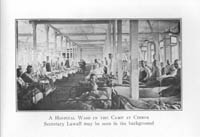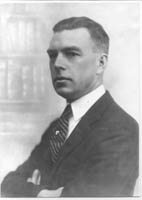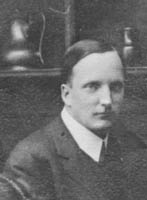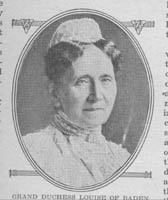Table of Contents
Key Figures
YMCA Secretaries
a | b | c | d | e | f | g | h | j | k | l | m | n-o | p | r | s | t-u | v | w | y-z
William Edward Lauterbach (1883-1961)
During the First World War, Lauterbach served as a War Prisoners' Aid Secretary for the American YMCA in Austria-Hungary. Lauterbach volunteered to work with Allied prisoners of war in the Dual Monarchy and arrived in October 1916. Edgar MacNaughton, the Senior WPA Secretary, assigned Lauterbach to work in prison camps in Bohemia and Lauterbach conducted work in Brüx, Deutsch-Gabel, Reichenberg, and Theresienstadt during the war. He volunteered to remain in Austria-Hungary with Clarence Bartz and MacNaughton after the United States declared war on Germany in early April 1917 and continued to correspond with prison camp Associations the WPA had established. Lauterbach did not leave the Dual Monarchy until the end of April 1917 as Austro-American relations deteriorated. He transferred to Russian work and provided welfare support services for Russian refugees. Lauterbach worked with the YMCA in Poland from 1921 to 1923.
Pastor Lauterbach
One of the first pioneers in war prisoner relief, the Swiss National YMCA Committee sent Reverend Lauterbach to Paris to conduct evangelical work with German prisoners of war in France early in 1915. Lauterbach was a clergyman at Bern and spoke French, German, and English. The German government approved his mission to provide spiritual solace to war prisoners. He had strong connections with Student Associations in Switzerland before the war began.
William H. Lawall
This American YMCA secretary was among the first of the second wave of War Prisoners Aid Secretaries to reach Germany (he followed Conrad Hoffman and James Sprunger). Lawall arrived in Germany in December 1915 on a one-year contract. Hoffman assigned Lawall to prison camps in West Prussia to provide welfare services to Russian prisoners, although Lawall did not speak Russian and had to work through an interpreter. Lawall experimented with WPA service early in the program and resided in a prison camp to develop an Association organization. While his work did result in the establishment of a strong Association, Hoffman deemed the practice as too costly in terms of time and man power and developed the visitation program to allow more Red Triangle workers to visit a larger number of prison camps. Lawall approached the Ministry of War to consolidate the large number of Russian and Serbian boy prisoners in one prison camp. The ministry approved Lawall's plan in the Fall of 1916 and assigned young POW's to Hammerstein, where Lawall set up a school and special boys' program. He also organized rehabilitation schools for wounded Russian prisoners at Hammerstein and Schütt to help these unfortunates to learn to read and write and to learn new occupations. Lawall left Germany in December 1916 at the end of his appointment.
Paul Le Seur
A German pastor, Reverend Le Seur was a leader in the German Christian Student Movement (GSCM) before the war. In October 1914, he met John R. Mott with Gerhard Niedermeyer, Georg Michaelis, and other GSCM leaders during the American General Secretary's initial investigation of wartime conditions in Europe. The German leaders eventually organized the German Student Service to provide relief to students mobilized by the German army. In 1937, Le Seur attended the Twenty-First World's Conference in Mysore, India as a German delegate.
Donald A. Lowrie (1889-1974)
Before World War I, Lowrie worked as the Assistant Secretary in the Cleveland YMCA and as Membership Secretary in the Association in Hamilton, Ohio. In 1916, Lowrie volunteered for service in Russia as a War Prisoners' Aid Secretary for Central Power POW's in Siberia. After the United States entered the war, Lowrie became the General Secretary of the Odessa and Moscow Associations from 1917 to 1918. He transferred to Archangel in northern Russia in 1918 to work with White Russian and Allied soldiers. Lowrie moved again in 1919, working as a Student Secretary for Russian students in Russia, Germany, and the Baltic States. Beginning in November 1919, he supervised WPA operations in Germany for Russian prisoners of war. This work included establishing educational, religious, and recreational work for these stranded prisoners. Lowrie also worked at Stettin supporting repatriation operations for the exchange of Russian and Central Power prisoners via Baltic ports. From 1922 to 1928, Lowrie served in Czechoslovakia, working with Russian students for the first three years and then leading student work across the republic. In 1928, he transferred to Yugoslavia to supervise student work in that kingdom. Lowrie retired from the YMCA in 1932 and became the Director of the United States House at the Cité Université in Paris. The approaching world war and rising wave of refugees convinced Lowrie to return to the YMCA in 1938. He worked with Paul B. Anderson to provide American Association relief to Russian, Czech, and Bulgarian refugees in France. Lowrie remained in France until October 1942, when he relocated to Switzerland to provide YMCA services to refugees there. From 1945 to 1950, Lowrie represented the World's Committee of the World's Alliance of YMCA's in relief work for displaced persons in France.
Walter Lowrie
An American clergyman in Rome, Reverend Lowrie agreed to replace Darius A. Davis as the Senior Secretary responsible for War Prisoners Aid (WPA) work for Central Power prisoners in Italy in January 1916. Dr. Lowrie became deeply involved in a diplomatic controversy between Italy and Austria-Hungary, which threatened to lead to reprisals against prisoners. On the basis of the Principle of Reciprocity, the Italians and Austro-Hungarians agreed to allow WPA Secretaries to provide welfare services to prisoners under their care. The Italians, however, delayed the construction of YMCA huts in their prison camps and the Austro-Hungarians threatened to cut off Association access to Italian prisoners in the Dual Monarchy. American YMCA funding speeded the construction of the promised halls in Italy and avoided serious repercussions. Lowrie resigned as Senior WPA Secretary in Italy in December 1916 and was replaced by M. B. Rideout.
Alfred Lowry, Jr.
This American YMCA secretary volunteered to serve Allied prisoners of war in German prison camps as a War Prisoners Aid Secretary during the Great War. Lowry arrived in Germany in April 1916, accompanied by his wife. Conrad Hoffman assigned Lowry as a Field Secretary to work in prison camps in Bavaria. During his tenure, Lowry raised a special fund for destitute Serbian prisoners of war and established a welfare program for civilians interned in the prison camp at Traunstein. Lowry left Germany in February 1917 with most of the other American WPA Secretaries after the United States broke off diplomatic relations with the German Empire. Initially assigned to Russia, the American YMCA decided to send Lowry to Paris where he became the Senior Secretary for American YMCA operations in France.
Grand Duchess Luise Marie Elizabeth of Baden (1856-1923)
Born a Princess of Prussia, Luise married Grand Duke Friedrich I of Baden. Friedrich died in 1907, but Luise remained active in public life as the dowager duchess. During World War I, Luise organized a number of women's relief organizations to support the war effort and provide welfare. This welfare work included charity work for prisoners of war and the grand duchess supported the War Prisoners' Aid program for Allied POW's in Baden.
Graf Luttichau
A German count, Luttichau was a member of the Board of Managers of the Constantinople YMCA at the beginning of the war. Prior to the conflict, the German and American Associations worked together to develop the Association Movement in the Turkish capital. In December 1915, Luttichau arranged for an interview between Ernst O. Jacob and the German Embassy to investigate the possibilities of the American YMCA organizing a War Prisoners' Aid program in the Ottoman Empire for Allied prisoners.
Emil Lutz
A Swiss YMCA secretary, Lutz volunteered to conduct relief operations for Allied prisoners of war incarcerated in Bulgaria as a World's Alliance War Prisoners Aid Secretary. He was one of five World's Alliance secretaries who worked under Ernst Sartorius in the kingdom during the Great War.



